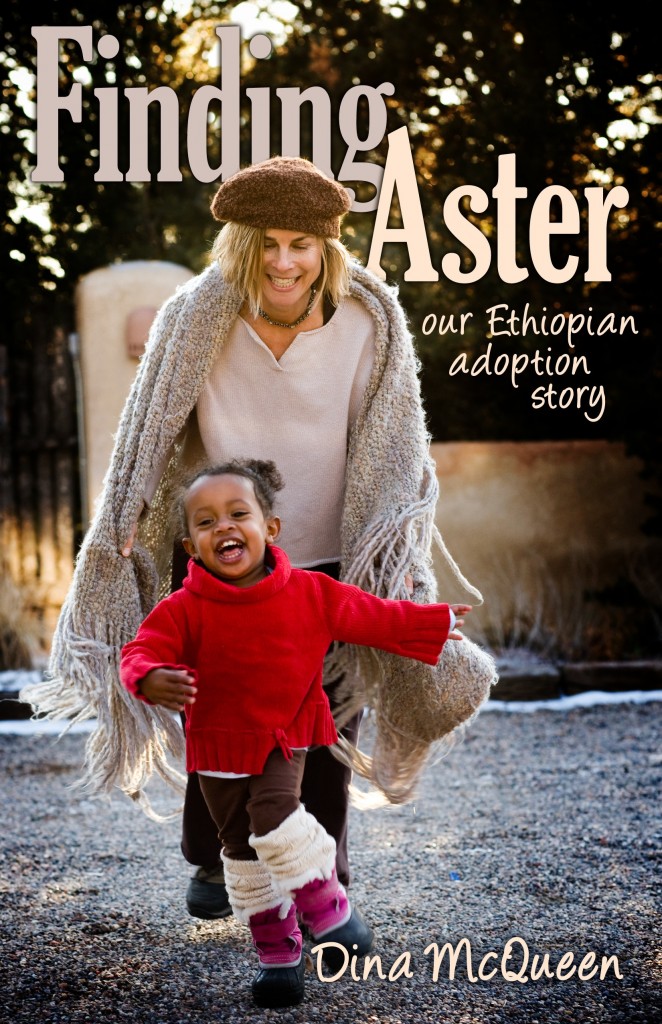One thing that I have loved about coming to parenting through adoption is the incredible people that I have met along the way. One of those people is Dina McQueen. Our adoptions were completed within a few months of each other, and she is an experienced writer and teacher. Dina’s book, Finding Aster: Our Ethiopian Adoption Story, has just been released, and many of you will find it interesting. I asked Dina to share some thoughts with us.
How did your interest in adoption develop, and what, ultimately, led you to Ethiopia
Though I never seriously thought about having a baby as a single woman, when I married my husband in 2004, we sometimes fantasized about becoming parents together. Finances, overpopulation, and my ill health, however, contributed to our decision not to procreate. When I had a hysterectomy in 2007, and finally became healthy (I had endometriosis for nearly two decades) we realized that we did indeed want to parent a child. We pursued international adoption first with Haiti, and later, after learning that it would take nearly two years to complete the process, decided on Ethiopia.
Tell us a little about Finding Aster and why you decided to write it.
After the surgical procedure that left me unable to bear children, my husband and I then decided to become parents. I found this incredibly ironic: only after it was impossible for me to give birth did I really pursue becoming a mother. I took the idea further in my mind and wanted to explore more deeply why only after I couldn’t give birth did I then want to have a child. The book developed as a result of the thoughts that wouldn’t leave me alone. I truly wanted to share with women the freedom I experienced in knowing that I was going to become a mommy without giving birth. I found this idea incredibly liberating.
What did you learn while writing the book?
Because the writing of the book was a three-and-a-half year process, I learned more than I ever could have imagined. The last third of the book, in fact, consists of three appendices that present the research I conducted, along with some of my own opinions. Overpopulation and how it relates to adoption, the infertility business and how it affects the women and couples that go through it, and the history of foster care and adoption in the United States are some of the topics I discuss.
What would you say to others who are considering adoption?
There are things I learned along the way that I wish I had known before going through the process, the main one being do your research. In my book, I offer an extensive Resource section providing websites and organizations I wish I had known about. I also would highly recommend for first time parents to read parenting books, and even enroll in a parenting class. Most social workers do not council prospective adoptive parents who have never before parented in a way that I feel could be most useful. Studying developmental psychology is very important. I also would suggest finding your adoption agency only through recommendations of others who were pleased with whom they chose. The lack of transparency in adoptions makes it imperative that you find the most honest and trustworthy adoption agency possible.
We regularly discuss self-awareness and community engagement on the blog. Given that, what do you most appreciate about yourself?
What a great question! To be honest, this somewhat stumps me! I suppose that at this point in motherhood I would say that I appreciate my ability to accept responsibility for mistakes made, ask forgiveness, and to not hold grudges. My daughter is teaching me to be a kinder, more respectful woman in all of my relationships. Because we ask of her to be kind and respectful (at 3.5 this is not an easy request for her to abide by!), I must be a model for kindness and respect. I appreciate that I am willing to learn new skills.
What community issues, in addition to adoption, really speak to you?
Having become a parent, I am more aware of the importance of good teachers, and good schools. I find it appalling that public schools have deteriorated to the point that so many parents feel it is necessary to find a way to put their child in private schools. I dislike how skewed government funding seems to have become. I dislike how much of the national budget is funneled outside of our country to support other countries. Finding a way to bring government funding back into our own communities seems to me the most important issue that we face today.
What do you wish all women knew?
I wish that all women knew how special it is to raise a child that did not come from her womb. How lovely it is to watch a child develop traits that do not resemble anybody she knows. I wish that all women knew that becoming a mother without giving birth is not only a viable choice but also one that makes sense for the planet.




Oh! I heard she was writing a book, thank you for passing the info along, how exciting! and what a great picture!!